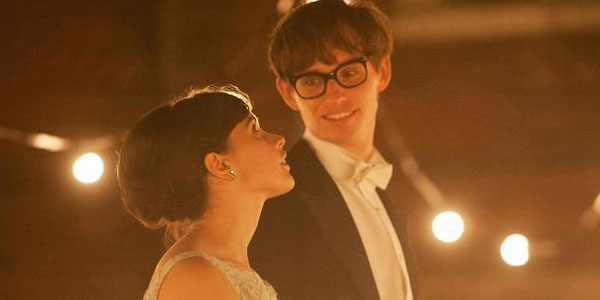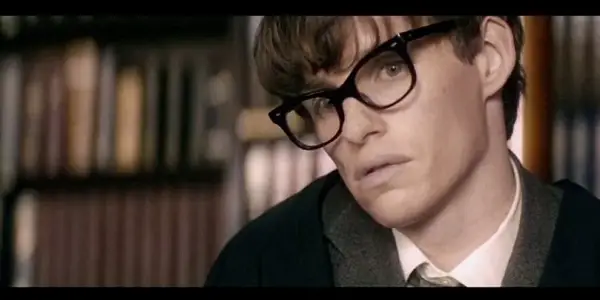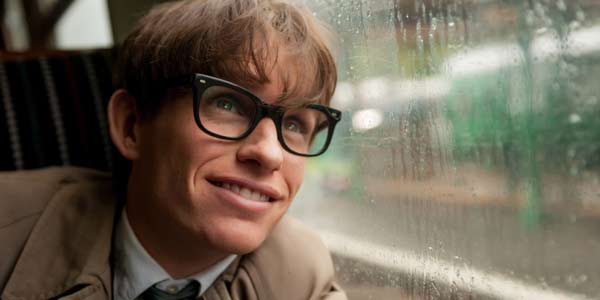THE THEORY OF EVERYTHING: A Romanticized, Yet Brilliantly Acted Biopic

David is a film aficionado from Colchester, Connecticut. He enjoys…
The Theory of Everything is the story of Stephen Hawking, reflecting his life from his early 20’s until decades later after he had become a world icon. It is at times overly romanticized, and tends to overlook certain elements of Hawking’s disease in order to instead focus on the obvious triumphs of his life. It is still a worthy film, though, and this is mostly due to Eddie Redmayne’s fantastic performance.
Beautiful, romantic story
The Theory of Everything begins when Stephen Hawking (Eddie Redmayne) was still a limber kid, with the thoughts of youth still very much on his mind. He is bright, nerdy, and charming, even managing to swoon the beautiful Jane Wilde (Felicity Jones). The chemistry between the two may be the first element that draws you into The Theory of Everything.

In a series of montages, with plenty of smiles, hand-holding, and dancing, the two fall in love, in the manner that only romantic movies can handle. Jane is the splitting image of flawless, cheerful youth, and she is tenderly played by Jones, who makes the initial connection to Hawking nothing less than enthralling. But then, as we know, tragedy strikes.
Eddie Redmayne is unrecognizable
Not too long after Hawking meets Jane, he is diagnosed with a fatal disorder, known as amyotrophic lateral sclerosis (ALS), and is given only two years to live. And it is here that Eddie Redmayne steals the film. Redmayne, who you may know from 2012’s Les Miserables, remarkably portrays Stephen Hawking at every stage of his life, from hopeful adolescent, to somber cripple, to eventual world-reknown physicist. At each point, we see a man who is slowly losing his body, yet at the same time gaining more of his brilliant mind.

Towards the middle of the film, and years later, Hawking loses the ability to speak. He had already been confined to a wheelchair, but now can only communicate by moving his fingers on a screen and having a robotic voice repeat his words. Even at this point, though, Redmayne manages to make Hawking’s personality emerge, and he is able to do it with just a twitch of the eyebrows, a downward glancing of his eyes, or an unlikely smile that stretches across his face. He makes us remember the once-lively person that greeted us at the start of the film, even though he can no longer move or talk. It is the type of transformative performance that the Academy likes to honor at the Oscars, along the likes of Robert De Niro in Awakenings or the journalist from the French film The Diving Bell and the Butterfly (also based on true stories).
Overly dramatic
What makes The Theory of Everything slightly less appealing than each of those films, though, is the tendency for director James Marsh to overly dramatize Hawking and his achievements. While his life is truly a remarkable one, it is also one full of downfalls and struggles, and these are rarely seen in detail throughout the length of the movie. We see the high points: the first time he received his advanced word-to-speech prompter; when he first settles down to write “A Brief History of Time”; when he speaks in front of a crowded and enthralled audience after the success of his book, expressing the statement “Where there is life, there is hope.” They are inspiring moments for sure, which may even stir up some emotions. But what about the painful moments that Hawking had to deal with before he was able to overcome his disease? Or the times that he wanted to give up before deciding to write his book?
The overarching story of the film involves Jane and Hawking’s relationship, and how they are eventually torn apart due to his increasingly debilitating illness. Many of their more pressing moments are glossed over, though, and they simply go from deeply in love to slightly indifferent. It’s the type of thing that happens often throughout the length of The Theory of Everything, replacing any actual drama in favor of the feel-good moments that come from triumphing in the face of adversity. It’s not necessarily a bad thing, but it also makes it less than great.

Conclusion
To conclude, The Theory of Everything is the type of inspirational story that is so often told in biopics. It is beautifully shot, emotionally driven, and a masterclass in acting. Eddie Redmayne‘s performance is likely to be the most praised aspect of the film over everything else, as it does tend to dramatize or otherwise skip over certain elements of the physicist’s life. But, for some inspiration, which might even make you reflect on the so-called “struggles” in your own life, this is not a film to be missed.
So what did you think of The Theory of Everything? Did it do justice to the story of Stephen Hawking? Let me know in the comments!
(top image source: Focus Features)
Does content like this matter to you?
Become a Member and support film journalism. Unlock access to all of Film Inquiry`s great articles. Join a community of like-minded readers who are passionate about cinema - get access to our private members Network, give back to independent filmmakers, and more.
David is a film aficionado from Colchester, Connecticut. He enjoys writing, reading, analyzing, and of course, watching movies. His favorite genres are westerns, crime dramas, horror, and sci-fis. He also enjoys binge-watching TV shows on Netflix.













